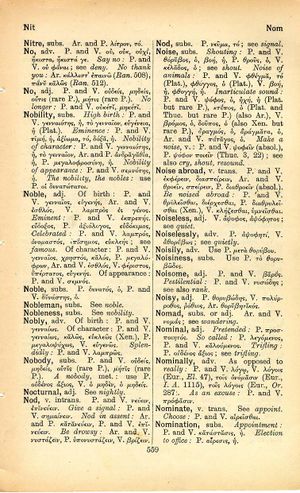no
Οὕτως γὰρ ἠγάπησεν ὁ Θεὸς τὸν κόσμον, ὥστε τὸν Υἱὸν τὸν μονογενῆ ἔδωκεν, ἵνα πᾶς ὁ πιστεύων εἰς Αὐτὸν μὴ ἀπόληται ἀλλ᾽ ἔχῃ ζωὴν αἰώνιον → For God so loved the world that he gave his only begotten Son that whosoever believeth in him should not perish but have everlasting life (John 3:16)
English > Greek (Woodhouse)
adv.
P. and V. οὐ, οὐκ, οὐχί, ἥκιστα, ἥκιστά γε. Say no: P. and V. οὐ φάναι; see deny. No thank you: Ar. κάλλιστʼ ἐπαινῶ (Ran. 508) , πάνυ καλῶς (Ran. 512). adj. P. and V. οὐδείς, μηδείς, οὔτις (rare P.), μήτις (rare P.). No longer: P. and V. οὐκέτι, μηκέτι.
Latin > English (Lewis & Short)
no: nāvi, 1, v. n. νέω,
I to swim, float.
I Lit.: alter nare cupit: alter pugnare paratu'st, Enn. ap. Paul. ex Fest. p. 166 Müll. (Ann. v. 258 Vahl.): pueris, qui nare discunt, scirpea induitur ratis, Plaut. Aul. 4, 1, 9; cf. below, Hor. S. 1, 4, 120: pinus Dicuntur liquidas Neptuni nāsse per undas, Cat. 64, 1: nat lupus, Ov. M. 1, 304: nantem delphina per undas, id. H. 19, 199: piger ad nandum, id. ib. 18, 210: ars nandi, id. Tr. 2, 486: nat tibi linter, Tib. 1, 5, 76; Luc. 8, 374.—Prov.: nare sine cortice, to swim without corks, i. e. to be able to do without a guardian (cf. above the passage in Plaut. Aul. 4, 1, 9), Hor. S. 1, 4, 120.—
II Poet., transf., to sail, flow, fly, etc.: cum juventus Per medium classi barbara navit Athon, Cat. 66, 45: (undae) nantes refulgent, id. 64, 274: nare per aestatem liquidam suspexeris agmen (apium), Verg. G. 4, 59.—Of the eyes of drunken persons, to swim: nant oculi, Lucr. 3, 480; v. nato.— Hence, nans, antis, P. a., swimming, floating: nantes scaphae, Gell. 10, 26, 10; as subst., a swimmer; hence, nantes, ĭum, f., swimming fowls, i. e. geese, ducks, etc.: greges nantium, Col. 8, 14, 1.

